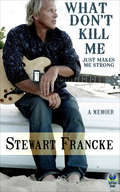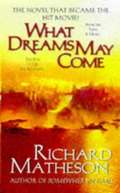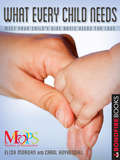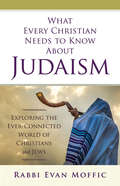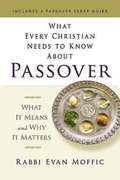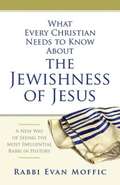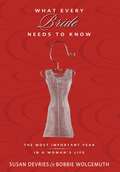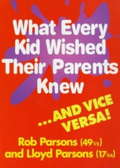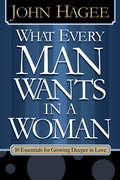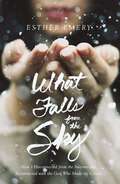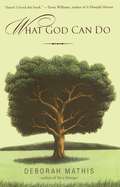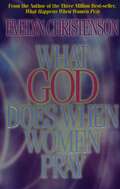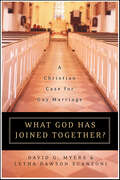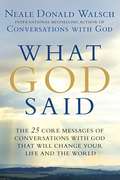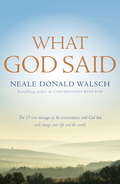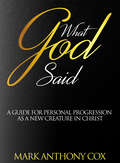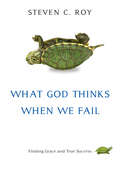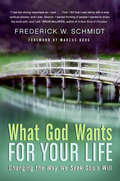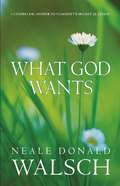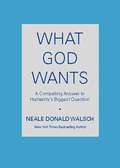- Table View
- List View
What Don't Kill Me Just Makes Me Strong: A Memoir
by Stewart FranckeThe Detroit music legend and founder of the Stewart Francke Leukemia Foundation shares his inspiring story of illness, faith, and the drive to survive. In this candid survival memoir, Stewart Francke recounts his remarkable journey with leukemia through a bone marrow transplant, complications, and eventual recovery. Understanding that his survival makes him part of the &“lucky unlucky,&” the young father and renowned musician finds the silver lining—and then some—in his struggle. Francke&’s story from initial biopsy to full recovery is often harrowing. Yet it is in the darkest moments that he learns important lessons about survival. Coming to understand that faith is a choice, he also realizes that only death is irrevocable. All else either makes us stronger or becomes part of the gift of life. Beginning each chapter with a brief but powerful lesson in living, Francke&’s singular story of illness, faith, and family is also a universal guide for facing adversity.
What Dreams May Come
by Richard MathesonWhat happens after we die? Chris Nielsen had no idea, until an accident cut his life short. In the afterlife, Chris learns that his wife is in danger herself, and he risks his soul to save her.
What Every Bride Needs to Know: The Most Important Year in a Woman's Life
by Bobbie Wolgemuth Susan DevriesThis is your guide to all the things that happen after “I do.” The advice in this book to brides is pretty simple. You don’t need to become an expert on men. Only one man. Learn the secrets to loving and respecting him while also asking for what you need. Take an honest look at your own family: its unwritten codes, how it has shaped you, and the ways it affects your relationship with your husband. Learn how to speak each other’s “language” and appreciate the qualities each of you brings to your marriage. Susan DeVries and Bobbie Wolgemuth offer a solid, approachable look at improving communication skills, secrets for a great sex life, budgeting basics, dealing with in-laws, navigating tough times and much more. Above all, you’ll cultivate a spiritual unity that draws the two of you closer to each other as you draw closer to God. What Every Bride Needs to Know will help make your first year together as husband and wife what it was meant to be: the most important year in your life.
What Every Child Needs: Meet Your Child's Nine Basic Needs for Love
by Elisa Morgan Carol KuykendallCombining real-life stories with expert research, the authors of What Every Mom Needs identify the different kinds of love that children need. From Elisa Morgan and Carol Kuykendall of MOPS International (Mothers of Preschoolers) comes a valuable resource for all mothers struggling to meet the challenges of raising young children. Full of encouragement and sound advice, this work outlines the nine basic needs for each child: Security, Affirmation, Belonging, Discipline, Guidance, Respect, Play, Independence, and Hope. Compiled with touching stories and helpful advice from moms and researchers alike, this book will help you to gain confidence as you continue to provide your children with their foundation for life.
What Every Christian Needs to Know About Judaism: Exploring the Ever-Connected World of Christians & Jews
by Evan MofficExplore the wisdom and traditions of the Jewish faith and examine what they mean for Christians."In this extraordinary book, Rabbi Evan Moffic takes Christians on a journey through the roots of our faith, by giving insight into the history and tradition that Jesus would have observed. In this way, Rabbi Moffic provides the backstory to the main story. If you want to get more from your faith, this book is a must-read!" —Dave Adamson, Pastor, North Pointe Church "Rabbi Moffic is an engaging teacher who excels at communicating ancient truths for modern audiences. His insights into Hebrew scriptures and the Jewish heritage of the Christian faith will be a blessing to all who want to learn." —Steve Gillen, Pastor, Willow Creek Community ChurchWhen Christians learn about Jewish tradition and history, they see the Bible and the life of Jesus with a new and enriched perspective. Knowing more about Judaism brings them closer to Jesus because Jesus lived and died as a Jew and consistently quoted the Jewish scripture and stories. In this book Evan Moffic, popular rabbi, author, and guide to Jewish wisdom for people of all faiths, continues the What Every Christian Needs to Know About series with an exploration of the wisdom and traditions of Judaism. Rabbi Moffic provides answers to hundreds of questions he receives about Judaism to provide a deeper understanding of the roots shared by Christians and Jews. Through this book’s explorations, readers will learn insights of the great Jewish sages to live a richer and more meaningful life, soak up the wisdom and traditions of Judaism, and a develop closer relationship with God. "My hope is that these teachings can serve as a way of fostering bonds focused not on the past and the troubled history between Jews and Christians, but rather one looking forward to a future in which we share wisdom with one another." – Rabbi Evan MofficProduct Features: A popular rabbi explores Jewish wisdom and traditions for Christian readers. Topics explored include: Jewish texts, spiritual life, holidays and events, and others. Highlights intersections of the Jewish and Christian faith that give deeper meaning to reading the Bible.
What Every Christian Needs to Know About Passover: What It Means and Why It Matters
by Evan MofficThe Passover was celebrated by Jesus and the disciples the last time they were together. Now popular speaker and writer Rabbi Evan Moffic brings an understanding to the Last Supper that will forever change how Christians celebrate Communion and prepare for Easter. Beginning with the Hebrew Bible and Jewish history, Rabbi Moffic shows how these inform the roots of Christianity as he weaves together history, theology, Jewish practice and observances. Then he provides the background and resources for Christians seeking to experience an authentic Jewish Passover Seder and integrate it into their own preparation for Easter. Rabbi Moffic brings an informed and ancient perspective, explaining and bringing to life the source of so many of our modern Christian practices.By exploring and explaining the ritual and story surrounding the Jewish Passover, Rabbi Moffic shares with Christians the wisdom and inspiration of the Hebrew Bible—what Christians call the Old Testament—in a way that increases appreciation and understanding of the culture in which Jesus lived and taught. For contemporary Christians desiring to enrich their understanding of the faith they practice today, this book offers deeper understanding of their spiritual heritage shared with Judaism.
What Every Christian Needs to Know About the Jewishness of Jesus: A New Way of Seeing the Most Influential Rabbi in History
by Evan MofficIf you were to ask ten people, Who started Christianity? you might hear ten voices giving the same quick response: Jesus. But those ten people would be wrong. Jesus wasn’t a Christian. Jesus lived and died as a Jew. Understanding the Jewishness of Jesus is the secret to knowing him better and understanding his message in the twenty-first century. Walking through Jesus’ life from birth to death, Rabbi Evan Moffic serves as a tour guide to give Christians a new way to look at familiar teachings and practices that are rooted in the Jewish faith and can illuminate our lives today. Moffic gives fresh insight on how Jesus’ contemporaries understood him, explores how Jesus’ Jewishness shaped him, offers a new perspective on the Lord’s Prayer, and provides renewed appreciation for Jesus’ miracles.In encountering his Jewish heritage, you will see Jesus differently, gain a better understanding of his message, and enrich your own faith.
What Every Christian Should Know About Islam
by Ruqaiyyah Waris MaqsoodOf the many books explaining Islam, few specifically address the concerns and questions of those from a Christian background. Moreover, the commonalities between the Abrahamic faiths--Judaism, Christianity, and Islam--are too often ignored. Set out in an easy and informative question-and-answer format, the book addresses the specific theological points of agreement and difference between Christianity and Islam, explains the core religious beliefs and practices of Islam, and answers today's most common questions of Islam and Muslims in an age when there is much conflict and misunderstanding. Islam is best judged not by the limitations and transgressions of its most extreme, ignorant, and outlandish followers, but by the example of its moderate majority, and Ruqaiyyah Waris Maqsood presents this introduction to the theology and practice of Islam in an attempt to explore some of the false impressions that surround it.Table of Contents:Section 1: The Religious Beliefs of Islam ExplainedSection 2: the Religious Duties of Islam ExplainedSection 3: Miscellaneous QuestionsSection 4: Christianity and IslamRuqaiyyah Waris Maqsood gained an honors degree in Christian Theology from the University of Hull in 1963 and then taught religious studies at various state schools until her retirement in 1996. She converted to Islam in 1986 and now lectures and writes on Islam.
What Every Groom Needs to Know: The Most Important Year in a Man's Life
by Robert Wolgemuth Mark DevriesThis is your guide to all the things that happen after “I do.” The advice in this book to grooms is pretty simple. You don’t need to become an expert on women. Only one woman. Learn the secrets to loving and cherishing her. Take an honest look at your family of origin: its unwritten codes, how it has shaped you, and the ways it affects your relationship with your wife. Learn how to speak each other’s “language” and appreciate the qualities each of you brings to your marriage. Robert Wolgemuth and Mark DeVries offer a solid, approachable look at improving communication skills, secrets for a great sex life, budgeting basics, dealing with in-laws, navigating tough times, and much more. Above all, you’ll cultivate a spiritual unity that draws the two of you closer to each other as you draw closer to God. Make this first year together as husband and wife what it was meant to be: the most important year in your life.
What Every Kid Wished their Parents Knew
by Rob Parsons Lloyd ParsonsRob Parsons teams up with his teen-age son, Lloyd, to write a warm and witty guide to parent/child communication. With cartoon illustrations.
What Every Kid Wished their Parents Knew
by Rob Parsons Lloyd ParsonsRob Parsons teams up with his teen-age son, Lloyd, to write a warm and witty guide to parent/child communication. With cartoon illustrations.
What Every Woman Wants in a Man/What Every Man Wants in a Woman: 10 Essentials for Growing Deeper in Love |10 Qualities for Nurturing Intimacy
by Diana Hagee John HageeOpposites Attract…and can thrive in a marriage built on God.The book starts with the results of a survey detailing the ten most important qualities that each man or woman wants in a spouse, then teaches us how we can be the person who breeds that quality in our husband or wife. Throughout the book the authors use their own personalities and experience with marriage to demonstrate how to do marriage right.
What Everyone Should Know about Islam and Muslims: Fourteenth Edition
by Suzanne HaneefA concise, readable, and fair interpretation.
What Falls from the Sky: How I Disconnected from the Internet and Reconnected with the God Who Made the Clouds
by Esther EmeryEsther Emery was a successful playwright and theater director, wife and mother, and loving it all - until, suddenly, she wasn’t. When a personal and professional crisis of spectacular extent leaves her reeling, Esther is left empty, alone in her marriage, and grasping for identity that does not define itself by busyness and a breakneck pace of life. Something had to be done.What Falls from the Sky is Esther’s fiercely honest, piercingly poetic account of a year without Internet - 365 days away from the good, the bad, and the ugly of our digital lives - in one woman’s desperate attempt at a reset. Esther faces her addiction to electronica, her illusion of self-importance, and her longing to return to simpler days, but then the unexpected happens. Her experiment in analog is hijacked by a spiritual awakening, and Esther finds herself suddenly, inexplicably drawn to the faith she had rejected for so long.Ultimately, Esther’s unplugged pilgrimage brings her to a place where she finally finds the peace - and the God who created it - she has been searching for all along. What Falls from the Sky offers a path for you to do the same. For all the ways the Internet makes you feel enriched and depleted, genuinely connected and wildly insufficient, What Falls from the Sky reveals a new way to look up from your screens and live with palms wide open in a world brimming with the good gifts of God.
What God Can Do
by Deborah MathisA compelling and eloquent meditation chronicling the experiences of real-life individuals as they face everyday trials and tragedies, recognizing that their lives have been touched by the divine. Growing up as the daughter of a Baptist minister, Deborah Mathis has always known the graceful presence of God. Even when times were tough, when she wavered in her faith and traveled down the ominous roads that ended in trouble, she always felt blessed by the consummate mercy of her God. In What God Can Do, Mathis bears witness to God's goodness, presenting true stories of ordinary people, their accounts of life's trials and triumphs, and how God can work simple miracles -- even for the least devout among us. Organized around ten different ways that God works in people's lives -- including Healing, Forgiveness, Transformation, and more -- What God Can Do is a collection of defining personal experiences, a sampling of soft and subtle miracles that most people chalk up to mere coincidence or "lucky breaks." A father who survives a dangerous surgery against all odds, a woman who beats cancer through "prayers of prevention," and a boy who lives with a bullet in his leg after a bloody hunting accident -- these are just a few of the miracles Mathis recounts in genuine and honest prose. Such everyday examples of God's providence are sure to touch, console, and inspire any reader seeking spiritual nourishment, especially today in a time of wide-scale war and civil unrest, when so much is uncertain and so many turn to prayer for answers and feats of divine intervention.
What God Does When Women Pray
by Evelyn ChristensonThirty years ago, Evelyn Christenson accepted this assignment. And after three decades of keeping track of God's answers to prayer, popular women's ministry leader Evelyn Christenson knows firsthand what God does when women pray.Sharing personal accounts of real-life women whose lives have been revolutionized by a renewed commitment to prayer, Evelyn encourages readers to persistently and fervently embrace the power of prayer to access the holy throne room of God and discover what He is anxiously waiting to do-when women pray!What God Does When Women Pray is now available in value-priced paperback as part of the "Nelson Value" Program-one-time-only, one-order-only bargain price ($7.97) on some of our best-selling and most exciting titles!
What God Has Joined Together: A Christian Case for Gay Marriage
by Letha Dawson Scanzoni Daivd G. MyersGay marriage has become the most important domestic social issue facing twenty-first-century Americans -- particularly Americans of faith. Most Christians are pro-marriage and hold traditional family values, but should they endorse extending marriage rights to gays and lesbians? If Jesus enjoined us to love our neighbors as ourselves, and the homosexual is our neighbor, does that mean we should accept and bless gay marriages? These and other, related questions are tearing many faith-based communities apart. Across the country, states have voted, courts have debated, and churches have divided over the legitimacy of same-sex marriage. Amid the uproar one perspective is decidedly missing: that of thoughtful, pro-marriage Christians who, informed by their faith, are struggling to make sense of this issue. What God Has Joined Together? is an effort to bridge the divide between marriage-supporting and gay-supporting people of faith by showing why both sides have important things to say and showing how both sides can coexist. Drawing on scientific research as well as on the Bible, the authors explain that marriage is emotionally, physically, financially, and spiritually beneficial for everyone, not just heterosexuals. They debunk myths about sexual orientation, assess claims of sexual reorientation, and explore what the Bible does and does not say about same-sex relationships. The book ends with a persuasive case for gay marriage and outlines how this can be a win-win solution for all.
What God Has Joined Together: The Christian Case for Gay Marriage
by Letha Dawson Scanzoni David G. MyersIt is an effort to bridge the divide between marriage-supporting and gay-supporting people of faith by showing why both sides have important things to say and showing how both sides can coexist. Drawing on scientific research as well as on the Bible, the authors explain that marriage is emotionally, physically, financially, and spiritually beneficial for everyone, not just heterosexuals.
What God Said
by Neale Donald WalschGod's number one message to the world. In just five words... "You've got me all wrong." Inspired by his nine-book Conversations with God series, many people have asked Neale Donald Walsch to find a way to deliver the most essential pieces of God's message to us in a more succinct way. The result is a concise text detailing and expanding just what we need to know about life and how to live it. Bringing their many conversations over the years into sharper focus than ever before, Walsch in What God Said encourages readers to cast aside religious and cultural trappings. To experience life as fallible--and human--beings, open minded, open-hearted, and all-embracing, and to build on, broaden, and enrich our Ancient Story. But to move forward on this ever-expanding and encompassing spiritual voyage means not only understanding what Walsch considers the most important insights of his Conversations with God, but also applying them in the most practical of ways. And so Walsch has included solid suggestions on how to apply each of the 25 Core Messages in daily life, The author says that should humanity begin carrying these messages forward, starting today, they can literally change the world.
What God Said
by Neale Donald WalschInspired by his nine-book Conversations with God series, many people have asked Neale Donald Walsch to find a way to deliver the most essential pieces of God's message in a more succinct way. The result is a concise text detailing and expanding just what we need to know about life and how to live it. Bringing his many conversations over the years into sharper focus than ever before, Walsch encourages readers to cast aside religious and cultural trappings, and to build on, broaden, and enrich our Ancient Story. But to move forward on this ever-expanding and encompassing spiritual voyage means not only understanding what Walsch considers the most important insights of his Conversations with God, but also applying them in the most practical of ways. And so Walsch has included solid suggestions on how to apply each of the 25 Core Messages in daily life. Should humanity begin carrying these messages forward, starting today, we can change the world.
What God Said: A guide for personal progression as a new creature in Christ
by Mark CoxWhat God Said is a guiding work to those who are new to the body of Christ and those who are well-established. Each chapter delves into the stages and nuances of life that each Bible follower has the ability to mature in as they intentionally put into practice the principles God has set in place. Every line is backed by a referenced scripture so that the reader may have the confidence to live a life declared by the word of God. The end result of reading this guide is life transformed by the renewing of one's mind.
What God Thinks When We Fail: Finding Grace and True Success
by Steven C. RoyWhat does God think of us when we fail? Does he thinkYou're a loser.There's no hope for you.What a wimp!You're good for nothing!Or does he think something very different? If you've ever lost a job or a relationship, let your friends down, seen your finances collapse, found your ministry crumbling or failed to meet your own ethical standards, you might wonder if recovery is possible. Perhaps you've wondered if you can ever repair the damage done to others, to yourself and to your relationship with God. Steve Roy has good news for you. He had to face his own failures, but his failures also drove him deep into what God thinks about us and success, especially in Christian ministry. He searched deeply in Scripture and listened carefully to the stories of others. He found that God's view of success is very different from ours. And that a biblically grounded view of success and failure challenges our preconceived notions but leads to hopeful renewal that goes beyond what we often ask or think.
What God Wants for Your Life
by Frederick W. SchmidtA Practical and Engaging Guide for Changing the Way We Seek God's Will How do we know God's will for our lives? This question lies at the heart of Christian life. And yet, attempting to understand our greater purpose can become a source of frustration as we look for help when making important life decisions. Spiritual retreat leader and Episcopal priest Fred Schmidt reveals how we can better recognize the difference between God's will and our own, deepen our ability to hear God's voice, and sharpen our powers of discernment.
What God Wants: A Compelling Answer to Humanity's Biggest Question
by Neale Donald Walsch"What God Wants" addresses humanity's most important question. For centuries - indeed, for millennia - our species has been trying to determine what it is that puts us in good standing with God, earning us a place in God's kingdom after our death, bringing us a good life while here on earth. Now, in a startlingly clear, direct and simple text, Neale Donald Walsch provides an answer that fits all religions and, ultimately, transcends them.
What God Wants: A Compelling Answer to Humanity's Biggest Question
by Neale Donald WalschBe careful. This book is dangerous. It explores with startling freshness the most important question you could ever ask, and offers with breathtaking courage the most extraordinary answer you could ever imagine.That answer is so theologically revolutionary and so spiritually empowering that it could change the course of human history. If embraced, it most certainly will change your life.There are people and institutions in the world, long in place and long in power, that want neither of these outcomes to occur. They would rather that you put this book down right now.It's up to you.
